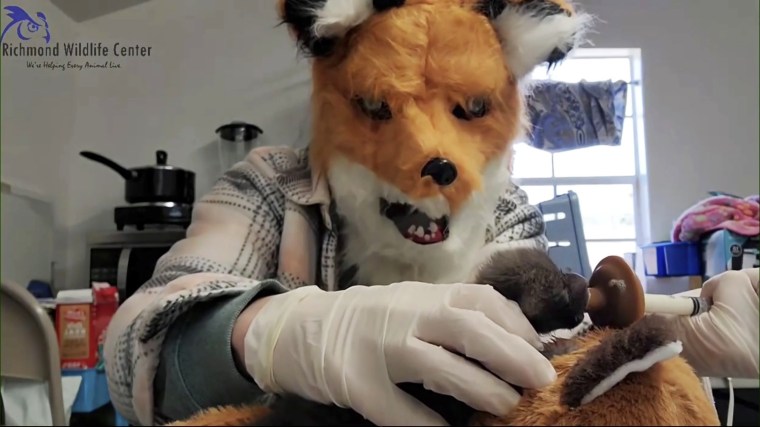A wildlife center has developed a way of stopping an abandoned newborn red fox from becoming too used to humans: By feeding it wearing a fox mask.
The Richmond Wildlife Center in Richmond, Virginia, shared a video of the center’s founder, Melissa Stanley, feeding milk to the tiny female kit — the term for a juvenile fox — while wearing the mask in an attempt to prevent imprinting, where animals form a strong bond shortly after birth with the first other animal it receives care from.
“It’s important to make sure that the orphans that are raised in captivity do not become imprinted upon or habituated to humans,” the center said in a Facebook post Tuesday.
“To prevent that, we minimize human sounds, create visual barriers, reduce handling, reduce multiple transfers amongst different facilities, and wear masks for the species,” the update said.
The center added that it was able to find other fox kits the same age and weight as the rescued fox.
The tiny fox, weighing just 80 grams (2.8 oz), was discovered by Richmond SPCA and handed over to the center on Feb. 29. Rescuers at first thought it was a cat, but soon realized it was a neonatal fox kit, with its eyes still shut and with its teeth yet to appear.

The center’s mask video echoed a scheme from a wildlife sanctuary in China in 2022, where workers dressed in panda outfits smeared with bear faeces and urine in an attempt to erase the memory of human contact from the captive pandas.
The center in Virginia used the incident to raise awareness of the dangers of rabies.
The people who found the fox handled it with bare hands, and the center warned that this put both the finder and the animal in danger.
Proper gloves must be worn to handle any stricken mammal found in the wild, including dogs and cats, to prevent the need for it to be killed and sent for rabies testing, it said.
The center added that, contrary to popular opinion, rabies does not always occur in animals acting aggressively.
The City of Richmond has reported two cases of rabies in domestic cats in the last five years, the center said, but none in foxes. There were 131 cases in cats across Virginia in the same timeframe, and 185 cases in foxes, the center said.
“While the risk of transmission of rabies from this newborn fox kit is minimal given statistics on foxes in the city of Richmond, it has no teeth, and was dehydrated with reduced saliva in its mouth, the risk is not zero,” the center said in a Facebook post on March 1.
The center said it would attempt to reunited the kit with its mother.
Source: | This article originally belongs to Nbcnews.com










